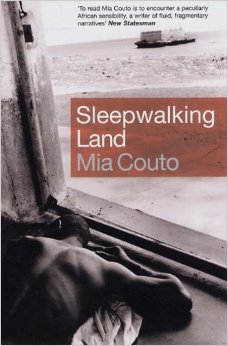"Sleepwalking Land" by Mia Couto
 Mozambique’s Mia Couto is an author I’ve only become familiar with in the past year. The only book I’ve read up until now was his short story collection “The Blind Fisherman”. “Sleepwalking Land” is the first full length novel I’ve read by him. It also happens to be his first novel, originally published in 1992. In “The Blind Fisherman”, Couto’s stories are awash with ‘Magical Realism’ but each had a distinct African flavor to them, combining African folklore, the fantastic and sometimes brutal realism.
Mozambique’s Mia Couto is an author I’ve only become familiar with in the past year. The only book I’ve read up until now was his short story collection “The Blind Fisherman”. “Sleepwalking Land” is the first full length novel I’ve read by him. It also happens to be his first novel, originally published in 1992. In “The Blind Fisherman”, Couto’s stories are awash with ‘Magical Realism’ but each had a distinct African flavor to them, combining African folklore, the fantastic and sometimes brutal realism.
In “Sleepwalking Land”, all these elements are also present. There is also a kinship to Cormac McCarthy’s “The Road”, although Couto’s novel preceded it by about a decade. Two of the main protagonists are refugees from Mozambique’s bloody civil war: An old man named Tahir and a young boy named Muidinga, who Tahir had taken in when he discovered the boy near death. The two wander the war torn landscape until they find a burnt out bus beside the road and they decide to take refuge in it in order to hide from the violent bands still roaming the countryside. It is there, among the charred bodies, where they make camp. One of the bodies is a man with suitcase. Muidinga rummages through the suitcase looking for something useful and he comes up with a series of notebooks written by the dead man who he learns is named Kindzu. In order to relieve the boredom, Tahir agrees to allow the boy to read aloud from these notebooks, which tells the story of the dead man and his search for a missing boy during the height of the conflict.
The novel’s chapters alternates between Tahir and Muidinga’s adventures as they try to survive, and Kindzu’s story, which tells of the horrors of a country at war with itself and it is in this tale where the meaning of the novel is revealed; and even though the two stories are different from one another, the more Kindzu’s story progresses, the closer to Tahir and Muidinga’s it starts to become and Couto handles this in a most brilliant way.
Full of magical realist elements, dream-like metaphors, and African folklore (I assume from Mozambique specifically), the story explores the effects of colonialism (Mozambique was a colony of Portugal) and how, once given its independence, turned on itself in the most brutal way. The magical realist elements in the story slightly mask the brutality of war and the effect on its victims, most of whom are just normal people, peasants, descendants of the colonists and foreigners and the difficulties to try to form a new nation with its diverse population, old vendettas, racial, ethnic and tribal strife. This is not a novel for the faint hearted and Couto’s prose is rich and poetic, forcing the reader to completely engage with not only the language but the beautiful imagery the language paints throughout the story.
“Sleepwalking Land” was voted “one of the 12 best African books of the 20th Century”. After reading this, I can easily see why. It’s not just a great read. It’s an experience. Highly recommended.
 3
3



